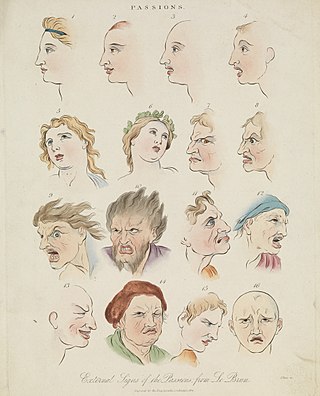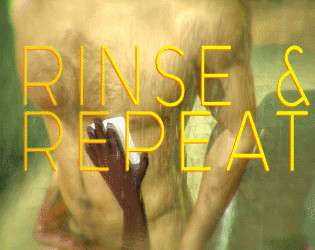
Erotica is literature or art that deals substantively with subject matter that is erotic, sexually stimulating or sexually arousing. Some critics regard pornography as a type of erotica, but many consider it to be different. Erotic art may use any artistic form to depict erotic content, including painting, sculpture, drama, film or music. Erotic literature and erotic photography have become genres in their own right. Erotica also exists in a number of subgenres including gay, lesbian, women's, bondage, monster and tentacle erotica.

A facial is a sexual activity in which a man ejaculates semen onto the face of one or more sexual partners. A facial is a form of non-penetrative sex, though it is generally performed after some other means of sexual stimulation, such as vaginal sex, anal sex, oral sex, manual sex or masturbation. Facials are regularly portrayed in pornographic films and videos, often as a way to close a scene.

Vorarephilia is a paraphilia characterized by the erotic desire to be consumed by, or to personally consume, another person or creature, or an erotic attraction to the process of eating in general practice. Soft vore fantasies are separated from sexual fantasies of cannibalism, also referred to as "hard vore", because the soft vore victim is normally swallowed alive and whole. The word vorarephilia is derived from the Latin vorare, and Ancient Greek φιλία.

Lesbian erotica deals with depictions in the visual arts of lesbianism, which is the expression of female-on-female sexuality. Lesbianism has been a theme in erotic art since at least the time of ancient Rome, and many regard depictions of lesbianism to be erotic.

Clothing fetishism or garment fetishism is a sexual fetish that revolves around a fixation upon a particular article or type of clothing, a particular fashion or uniform, or a person dressed in such a style.

Emotion classification, the means by which one may distinguish or contrast one emotion from another, is a contested issue in emotion research and in affective science. Researchers have approached the classification of emotions from one of two fundamental viewpoints:
- that emotions are discrete and fundamentally different constructs
- that emotions can be characterized on a dimensional basis in groupings
Although humor is a phenomenon experienced by most humans, its exact cause is a topic of heavy debate. There are many theories of humor which attempt to explain what it is, what social functions it serves, and what would be considered humorous. Although various classical theories of humor and laughter may be found, in contemporary academic literature, three theories of humor appear repeatedly: relief theory, superiority theory, and incongruity theory. These theories are used as building blocks for the rest of the theories. Among current humor researchers, there has yet to be a consensus about which of these three theories of humor is most viable. Proponents of each theory originally claimed that theirs explained all cases of humor, and that it was the only one capable of doing so. However, they now acknowledge that although each theory generally covers its area of focus, many instances of humor can be explained by more than one theory. Similarly, one view holds that theories have a combinative effect; Jeroen Vandaele claims that incongruity and superiority theories describe complementary mechanisms that together create humor.
Emotional responsivity is the ability to acknowledge an affective stimuli by exhibiting emotion. It is a sharp change of emotion according to a person's emotional state. Increased emotional responsivity refers to demonstrating more response to a stimulus. Reduced emotional responsivity refers to demonstrating less response to a stimulus. Any response exhibited after exposure to the stimulus, whether it is appropriate or not, would be considered as an emotional response. Although emotional responsivity applies to nonclinical populations, it is more typically associated with individuals with schizophrenia and autism.

Octodad: Dadliest Catch is an independent adventure video game developed and published by Young Horses. It is a sequel to the 2010 freeware game Octodad. The game consists of controlling the protagonist Octodad in completing chores typical of the mundane suburban father, but complicated by the fact that he is an octopus in disguise.

Five Nights at Freddy's 2 is a 2014 point-and-click survival horror game developed and published by Scott Cawthon. It is the second installment in the Five Nights at Freddy's series. Set in a fictional pizzeria, the player takes on the role of a night security guard and must defend themselves from the restaurant's hostile animatronic mascots. The player cannot leave their office, but has access to security cameras throughout the restaurant to monitor animatronic activity. Wearing a mask that looks like one of the animatronics allows the player to avoid being detected in most cases, though some animatronics are repelled through other methods. If an animatronic enters the office and the player is detected, they will be killed. As the game progresses, Atari-styled minigames and phone calls provide insight into the history of the restaurant.

Shiro Games is a video game development company based in Bordeaux, France. The company was founded in 2012 by Sebastien Vidal and Nicolas Cannasse, and developed the Evoland series and Dune: Spice Wars.

I Am Bread is a platform video game published by Bossa Studios on 9 April 2015. The game is available for Microsoft Windows, OS X, iOS, PlayStation 4, Ouya, Xbox One, and Android. It was removed from Google Play at an Jan 2020. The gameplay involves using various abilities, such as sticking to surfaces to solve puzzles and reach the toaster. Along the way, players must avoid hazards like dirty floors, knives, and pets.

Duck Game is a 2D action game developed by Landon Podbielski and published by Adult Swim Games. The game was released for the Ouya in 2014, and for Microsoft Windows in 2015. A PlayStation 4 version was released in August 2017, and a Nintendo Switch version was released in May 2019.
Kitty Horrorshow is the pseudonym of an independent video game developer. Releasing her games on the distribution platform itch.io, she specializes in the psychological horror genre, with her games focusing on surreal and atmospheric horror in the aesthetic style of early 3D videogames.

100ft Robot Golf is a 2016 sports video game developed and published by No Goblin. In the game, players control mechas and must race to shoot a golf ball into the hole. 100ft Robot Golf was released in October 2016 for PlayStation 4 and PlayStation VR and in March 2017 for Windows. The game was met with a mixed reception.
Robert Yang is an academic, artist, and indie video game developer, whose work often explores gay subculture and the boundary between video games and art. His work focuses particularly on sociologically deviant and sometimes illegal sexual behavior. His projects include Borges adaptation Intimate, Infinite and The Tearoom, a game that involves soliciting sex in a public toilet. He is a former member of faculty at NYU Tisch School of the Arts's Game Center and curated their annual indie game exhibition in 2015.

The Tearoom is a 2017 game by independent developer Robert Yang. Described by the creator as a "historical public bathroom simulator", The Tearoom is an erotic game that simulates the experience of participating in 'tearoom' public sex, also known as cottaging, with the goal of avoiding interference with the police. Taking inspiration from the 1970 non-fiction book Tearoom Trade and a 1962 public sex bust by police in Mansfield, Ohio, Yang developed the game as a political commentary on the past and present traditions of queer sex and persecution of sex by police. Upon release, The Tearoom received attention from publications and academics about the relevance of its historical subject matter and the effectiveness of its gameplay to convey themes of uncertainty and danger.

Ahegao (アヘ顔) is a term in Japanese pornography for a facial expression of characters during sexual arousal or an orgasm, typically with rolling or crossed eyes, protruding tongue, and slightly reddened face, to show enjoyment or ecstasy. The style is often used in erotic manga, anime, and video games.

Rinse and Repeat is a 2015 erotic video game by independent developer Robert Yang, described as a "steamy first person showering game about giving a hunk a helping hand". Developed by Yang as a "fantasy about consent and safety", Rinse and Repeat features a procedurally generated schedule in which players are only able to interact with their virtual partner at times set by the game. The game received positive reception from reviewers, with praise directed to the game's use of time and waiting to represent consent and respect, and as a homoerotic commentary on the male experience of communal showering.

Cobra Club is a 2015 video game by independent developer Robert Yang. Players navigate a fictitious mobile application as a nude character standing before a mirror to take and send dick pics as customisable photos of their character's penis. These images, shared initially with other automated users of the platform, are revealed at the end of the game to have been uploaded without the player's awareness to an online page on blogging website Tumblr. Inspired by critiques of mass surveillance and the privacy issues of dating apps, Yang developed Cobra Club to provide players with a "safer space" to simulate taking dick pics and make the player aware of the data and privacy implications of those practices in real life.

















